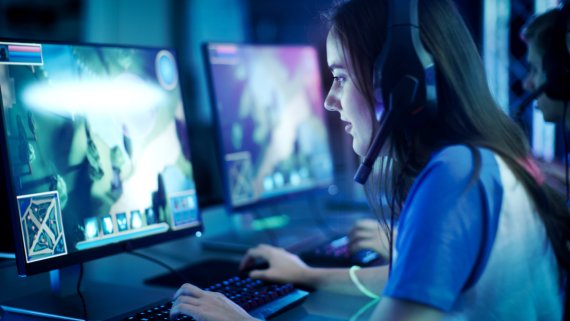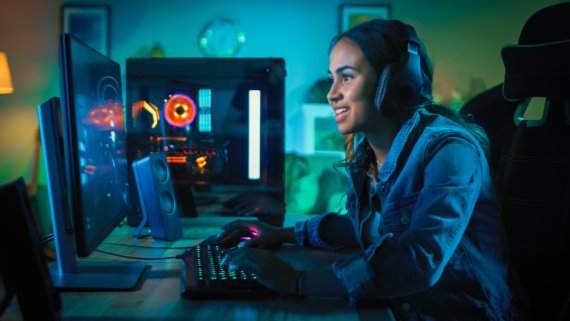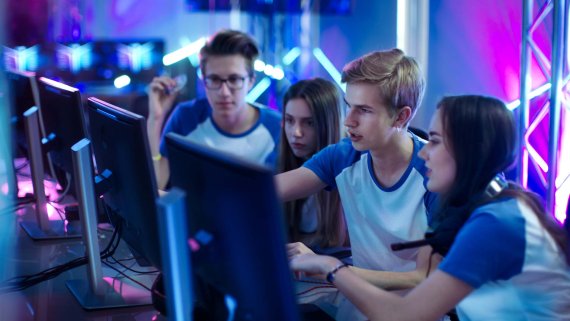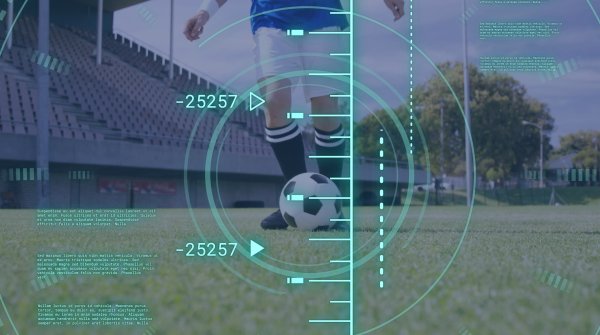
Gaming and competitive gaming, or eSports, are theoretically very inclusive and diverse. Unlike traditional sports such as soccer, tennis, volleyball, track and field, where men's and women's teams, as well as physically impaired individuals, must compete separately, eSports is inclusive. Anyone can compete against anyone, with the ultimate focus being on in-game skills.
This inclusivity is exemplified by eSports pros like Niklas Luginsland, who was featured at ISPO Digitize 2019 on ISPO.com. Despite having brittle bone disease, he has been a FIFA professional for VFB Stuttgart for several years, playing the soccer simulation game at the highest level in the German Bundesliga.
"In terms of my physical limitations, there are no barriers in eSports. In eSports, I can, just like anyone else, take the controller in hand and go. I can achieve success just as easily."
More and more female eSports pros are also in the spotlight. Sasha "Scarlett" Hostyn has been a star in the eSports world for years. In StarCraft 2, she has been among the best players in the world and consistently among the top 10 non-Korean players in terms of both prize money won and the Elo system for nearly the past decade.
However, despite these positive examples of the inclusive possibilities of eSports, true diversity, especially at the professional level, is not yet a reality. The majority of professional gamers are male. According to a recent estimate, only 5% of professional players are female. This is staggering when compared to the nearly 60% of women ages 18-29 who regularly play video games. As a result, the professional gaming sector is 95% dominated by men. Due to this lack of diversity, several groups and movements within the industry are working to make eSports more inclusive overall.
Whenever the discussion about women in the eSports sector arises, it is essential to also consider the broader gaming scene and eSports culture. Playing video games is not yet as accepted in society and is less widespread among young girls compared to boys. Consequently, girls often start gaming later and are more likely to stop, especially during their teenage years. However, this trend is changing. In 2020, 96% of boys and 76% of girls reported playing video games regularly, compared to 96% and 63% in 2018. These figures indicate that social acceptance of gaming among young girls has significantly increased in recent years.
Additionally, young girls seldom see themselves as real gamers, often viewing computer games as just a pastime. In contrast, boys are more likely to identify as gamers and structure their lives around computer games and eSports. In the same survey, many boys expressed the desire to have a future where computer games played a central role, envisioning careers as eSports athletes, streamers, or game developers.
However, even though fewer young girls and women see computer games as a fixed part of their lives, those who do often face more problems in the online world than their male counterparts. eSports is far from providing equal opportunities in this regard.
The personal experiences of many female players reveal that boys and men often do not take them seriously, and they frequently face sexual harassment. If they do not respond to these advances, they are often met with sexist insults. It is difficult to imagine developing the necessary motivation in such an environment to put in the time and effort required to compete at the highest levels in eSports.
A discussion about diversity and equality in eSports is therefore essential and must be addressed.
In the search for explanations for the lack of diversity, it is crucial to consider the foundations of the gaming community. Only those who start as casual gamers can eventually become professionals. However, the vast majority of women never reach the professional level, which could be attributed to the toxic gaming community.
Anyone who has ever played a multiplayer online game knows that toxic comments, trolling, and cyberbullying are commonplace. This phenomenon has been a problem in the gaming world since its inception. While some games experience it more than others, ultimately, every popular multiplayer game is affected by it. In a 2020 study using the Toxic Comment Classifiers by IBM, various gaming communities on the internet platform Reddit were investigated to determine which games struggle most with this problem. The results showed that almost all highly competitive eSports titles, such as Counter-Strike: Global Offensive, DOTA 2, League of Legends, and Overwatch, are among the most toxic communities. Therefore, if you play these games regularly, sooner or later (and usually sooner) you'll encounter homophobic, sexist, and racist statements.
This pervasive toxicity can deter many women from investing the time and effort needed to reach the highest levels in eSports, making a discussion about diversity and equality in eSports essential.

By the way, women are particularly affected by this. A study by PickFu and Utopia Analytics from November 2021 shows that 30% of women surveyed have directly experienced insults and toxicity while playing online games. Most of them (72%) have directly encountered sexism and misogyny. In comparison, none of the male respondents reported experiencing any form of gender discrimination.
LGBTQ+ gamers also report similar experiences. A report published by the gaming website OnlineRoulette, based on a survey of 788 people between the ages of 18 and 70, shows that 73% of LGBTQ+ athletes have been harassed because of their sexual orientation or gender identity. Players who come out online are 21% more likely to experience verbal harassment than other players.
This pervasive toxicity disproportionately impacts women and LGBTQ+ gamers, highlighting the urgent need for discussions about diversity and equality in eSports.
The eSports industry itself recognizes that the current state of the professional scene is not desirable. In recent years, game makers, tournament organizers, and eSports organizations have launched projects that highlight women and LGBTQ+ gamers, promoting the diversity and inclusive possibilities of eSports.
However, not all that glitters is gold. Tournaments and leagues exclusively for women's teams spark debates about whether male and female players should even compete together. Often, these projects appear more like failed PR stunts than genuine measures to promote diversity in eSports.
In 2019, the Russian eSports organization Vaevictis fielded an all-female team for the first time in the League of Legends Continental League (LCL). However, the team failed to record a single win in 28 matches, set a league record for the shortest average game time—indicating the fastest average losses—and had the most frequent in-game deaths. Consequently, Riot Games, the game developer and tournament organizer, removed the team from the LCL the following season. Whether this project genuinely succeeded in promoting women in eSports and encouraging female gamers to pursue professional careers remains debatable.
However, there are also positive examples and diversity-promoting projects. For instance, Telekom is committed to fostering more diversity in eSports and gaming as part of the Equal eSports Initiative.
"Gaming and eSports are now fixed components of the everyday culture of many adolescents. With this new initiative, Telekom wants to support this movement and address key issues such as diversity, inclusion, and strengthen digital education," says Birgit Bohle, Chief Human Resources Officer and Labor Director at Deutsche Telekom AG.
The project includes a professional female team in the game League of Legends in cooperation with SK Gaming. The first all-female professional team in Germany will receive professional training, enabling them to compete at the highest level.
Another part of the initiative is the Female Player Program, which focuses on promoting young female players. Additionally, the initiative includes the Equal eSports Council, consisting of 13 top female players and notable figures in the eSports scene like Melly, Miss Rage, Anna Baumann, and Kristin Banse. Together with a network of strong women from the business world, this council will guide the program.
The initiative also extends support beyond women to include people with impairments, ensuring their presence in eSports is promoted through suitable projects. One notable example is the cooperation between Microsoft and the Paralympics on the "Gaming for Inclusion" project. This virtual, multi-day eSports tournament brought together more than 90 Paralympic athletes to compete in games such as Forza Motorsport 7, Madden NFL 22, and Rocket League.

eSports has, perhaps even more than traditional sports, the potential to connect people, bring them together, and overcome borders. However, it is crucial to understand that this theoretical possibility does not automatically translate into practical implementation. All those involved in the industry—whether game developers, tournament organizers, sponsors, brands, and, of course, players themselves—must recognize that eSports is far from being as inclusive as it often claims to be. Fundamental social differences play a significant role in this, but the gaming community is not entirely blameless.
It is important to allow an open discussion about the grievances and problems, as well as the positive projects in this area. At the same time, players of all kinds who are part of or want to join the gaming and eSports community should be promoted, celebrated, and appreciated by this very community.
 SportsTechUnlocking the Future of Sports with AI
SportsTechUnlocking the Future of Sports with AI
- ISPO awards
- Mountain sports
- Bike
- Design
- Retail
- Fitness
- Health
- ISPO Job Market
- ISPO Munich
- ISPO Shanghai
- Running
- Brands
- Sustainability
- Olympia
- OutDoor
- Promotion
- Sports Business
- ISPO Textrends
- Triathlon
- Water sports
- Winter sports
- eSports
- SportsTech
- OutDoor by ISPO
- Heroes
- Transformation
- Sport Fashion
- Urban Culture
- Challenges of a CEO
- Trade fairs
- Sports
- Find the Balance
- Product reviews
- Newsletter Exclusive Area
- Magazine



